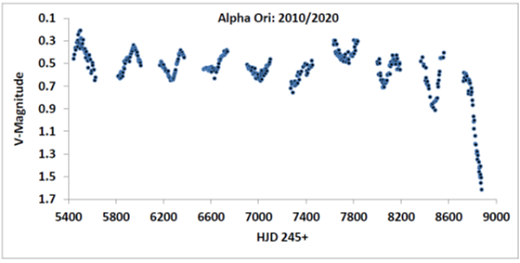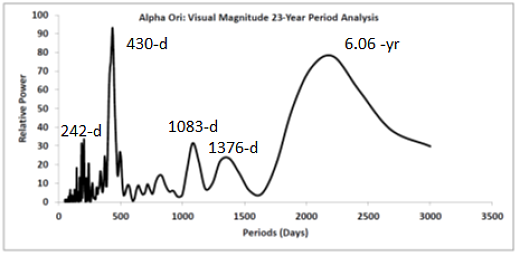SPACEWEATHER.COM:
THE CONTINUING MYSTERY OF BETELGEUSE: For months, astronomers have been keeping a wary eye on Betelgeuse, the bright red star in Orion's shoulder. What's attracting their attention? All of a sudden, Betelgeuse isn't bright anymore. Its visible luminosity has "fallen off a cliff"--a sign that the star could be on the verge of going supernova.
"The most recent measurements put the visual magnitude of Betelgeuse at about +1.66, the dimmest its been in our 25 years of photometry," says Edward Guinan of Villanova University.

Above: The horizontal axis is Heliospheric Julian Date (HJD). For reference, Jan. 30, 2020, the date of the most recent measurement, has an HJD of 2458879.
Betelgeuse is a highly evolved red supergiant--the type of star that could collapse and explode at any moment. Indeed, the dimming of Betelgeuse could be explained if the star has suddenly contracted to about 92% of its previous radius. But that's not the only possibility. Betelgeuse might be dimmed by a giant starspot--or maybe it is shrouded by an outburst of stardust from its own cool outer layers--or something else entirely. No one knows.
Answers might be forthcoming on Feb. 21st. Astronomers have long known that Betelgeuse is a variable star. It pulsates with many periods, as shown in this Fourier analysis of Betelgeuse's light curve:

Above: A period analysis of 23 years (1995-2018) of Betelgeuse photometry.
"This shows a dominant (probable pulsation) period of P = 430 days," note Guinan and colleague Richard Wasatonic in a recent Astronomical Telegram. Given this result, "the minimum brightness is expected on 21 (+/-7d) February 2020."
If Betelegeuse starts to bounce back on Feb. 21st, this whole episode might just be a deeper-than-average pulsation, and perhaps the supernova watch can be called off. However, notes Guinan, "even if the 430-day period is still working, this would indicate a minimum brightness near 0.9 mag--much brighter than the current value near 1.6 mag. So something very unusual is going on
NEW YORK TIMES:
Is Betelgeuse about to blow?
Probably not, but astronomers are having fun thinking about it.
Over the last three months, the star, which marks the armpit of Orion the hunter, has mysteriously dimmed to less than half its normal brightness, markedly altering one of the great sights of the winter sky.
At the beginning of January the star was fainter than ever before observed, according to Edward Guinan of Villanova University, who has been compiling data on Betelgeuse. In its “fainting” spell, Dr. Guinan said, the star has dropped from seventh to twenty-first on the list of brightest stars in the sky. But even so dimmed, Betelgeuse is still too bright to be easily observed and measured by large professional telescopes — at least not without damaging sensors that were designed to wring every faint photon from the blackness of space.
Rebecca Oppenheimer, an astrophysicist at the American Museum of Natural History in New York, said she had managed to observe Betelgeuse with the 200-inch telescope at Palomar Observatory in California last week, but it had left an afterimage that put their detector out of service for a day. The next time around, she said in an email, they plan to cover part of the giant mirror, to cut down on the amount of light it receives.
“Ha ha, kind of ridiculous,” she wrote. “But, well, the science must go on!”
Last week Neil deGrasse Tyson, director of the Hayden Planetarium in New York, circulated a request for amateur astronomers to observe and monitor Betelgeuse’s brightness.
-------------------------------------------------------------------------Nomenclature
α Orionis (Latinised to Alpha Orionis) is the star's designation given by Johann Bayer in 1603.
The traditional name Betelgeuse is derived from either the Arabic إبط الجوزاء Ibṭ al-Jauzā’, meaning "the armpit of Orion", or يد الجوزاء Yad al-Jauzā’ "the hand of Orion". In English there are four common pronunciations of this name, depending on whether the first e is pronounced short or long and whether the s is pronounced 's' or 'z':[1][2]
/ˈbɛtəldʒuːz/
/ˈbiːtəldʒuːz/
/ˈbɛtəldʒuːs/
/ˈbiːtəldʒuːs/,
the last popularized for sounding just like "beetle-juice". /WIKIPEDIA
